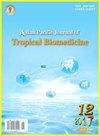茴香抑制脂多糖诱导的小胶质细胞活化,改善神经炎症介导的小鼠行为缺陷
IF 1.7
4区 医学
Q3 TROPICAL MEDICINE
引用次数: 0
摘要
研究茴香提取物对脂多糖(LPS)诱导的体外小胶质细胞活化以及小鼠认知行为缺陷的影响。 用 MTT 法测量 LPS 激活的 BV-2 细胞的活力,用 DCF-DA 法研究活性氧(ROS)。抗氧化酶和促炎介质则通过各自的酶联免疫吸附试剂盒和 Western 印迹法进行分析。在体内试验中,每天给雄性瑞士白化小鼠注射 LPS(1 毫克/千克,静脉注射),连续五天,以产生慢性神经炎症。对 LPS 诱导的小鼠进行了认知和行为测试,包括开阔地实验、被动回避实验和转体实验。 茴香提取物(25、50 和 100 μg/mL)显著降低了 LPS 激活的一氧化氮(NO)、ROS、环氧化酶-2、诱导型 NO 合酶、IL-6 和 TNF-α 的增加(P < 0.05)。此外,茴香提取物还能显著改善 LPS 诱导的氧化应激和抗氧化酶水平的降低(P < 0.05)。该提取物还能调节 BV-2 细胞中的 NF-κB/MAPK 信号传导。在一项体内研究中,枸杞提取物(50、100 和 200 毫克/千克)明显减轻了 LPS 引起的小鼠认知和运动障碍。指纹图谱分析表明,芦丁、山柰酚-3-O-葡萄糖苷和茴香醚是可识别的化合物。 枸杞子提取物能改善BV-2小胶质细胞在LPS刺激下的神经炎症反应,并改善LPS给药小鼠的认知能力和运动能力。本文章由计算机程序翻译,如有差异,请以英文原文为准。
Foeniculum vulgare Mill. inhibits lipopolysaccharide-induced microglia activation and ameliorates neuroinflammation-mediated behavioral deficits in mice
To investigate the effect of Foeniculum vulgare extract against lipopolysaccharide (LPS)-induced microglial activation in vitro as well as cognitive behavioral deficits in mice.
LPS-activated BV-2 cell viability was measured using MTT assay and reactive oxygen species (ROS) was studied using DCF-DA assay. The antioxidative enzymes and pro-inflammatory mediators were analyzed using respective ELISA kits and Western blotting. For in vivo testing, LPS (1 mg/kg, i.p.) was given daily for five days in male Swiss albino mice to produce chronic neuroinflammation. Cognitive and behavioral tests were performed using open-field, passive avoidance, and rotarod experiments in LPS-induced mice.
Foeniculum vulgare extract (25, 50 and 100 μg/mL) significantly attenuated the LPS-activated increase in nitric oxide (NO), ROS, cyclooxygenase-2, inducible NO synthase, IL-6, and TNF-alpha (P < 0.05). Moreover, LPS-induced oxidative stress and reduced antioxidative enzyme levels were significantly improved by Foeniculum vulgare extract (P < 0.05). The extract also regulated the NF-κB/MAPK signaling in BV-2 cells. In an in vivo study, Foeniculum vulgare extract (50, 100, and 200 mg/kg) markedly mitigated the LPS-induced cognitive and locomotor impairments in mice. The fingerprinting analysis showed distinctive peaks with rutin, kaempferol-3-O-glucoside, and anethole as identifiable compounds.
Foeniculum vulgare extract can ameliorate LPS-stimulated neuroinflammatory responses in BV-2 microglial cells and improve cognitive and locomotor performance in LPS-administered mice.
求助全文
通过发布文献求助,成功后即可免费获取论文全文。
去求助
来源期刊

Asian Pacific journal of tropical biomedicine
Biochemistry, Genetics and Molecular Biology-Biochemistry, Genetics and Molecular Biology (miscellaneous)
CiteScore
3.10
自引率
11.80%
发文量
2056
审稿时长
4 weeks
期刊介绍:
The journal will cover technical and clinical studies related to health, ethical and social issues in field of biology, bacteriology, biochemistry, biotechnology, cell biology, environmental biology, microbiology, medical microbiology, pharmacology, physiology, pathology, immunology, virology, toxicology, epidemiology, vaccinology, hematology, histopathology, cytology, genetics and tropical agriculture. Articles with clinical interest and implications will be given preference.
 求助内容:
求助内容: 应助结果提醒方式:
应助结果提醒方式:


